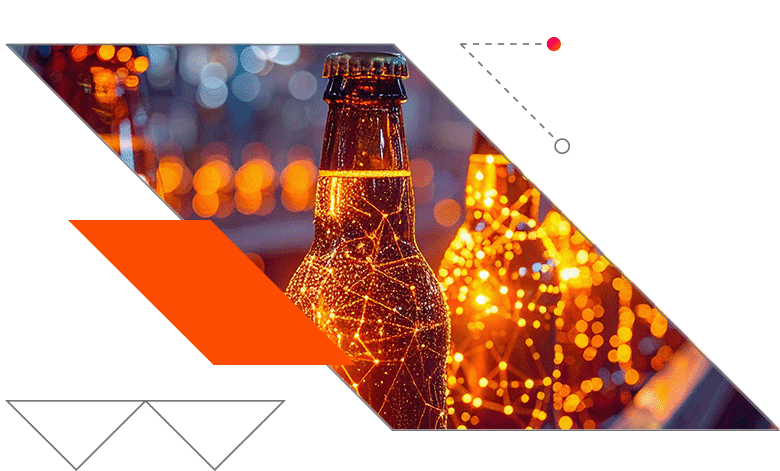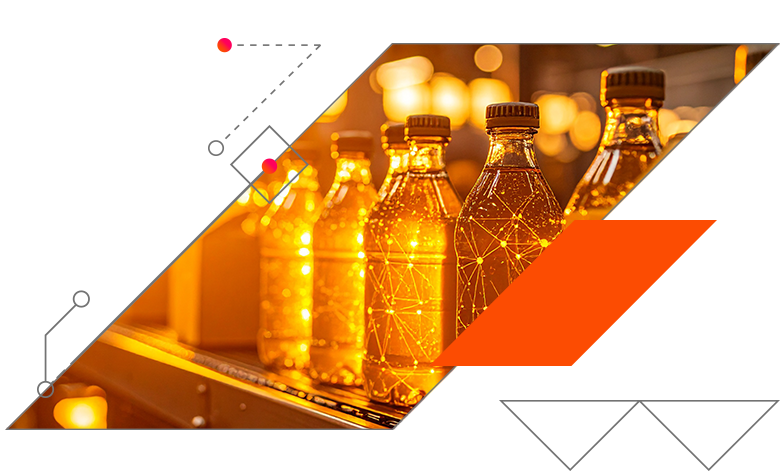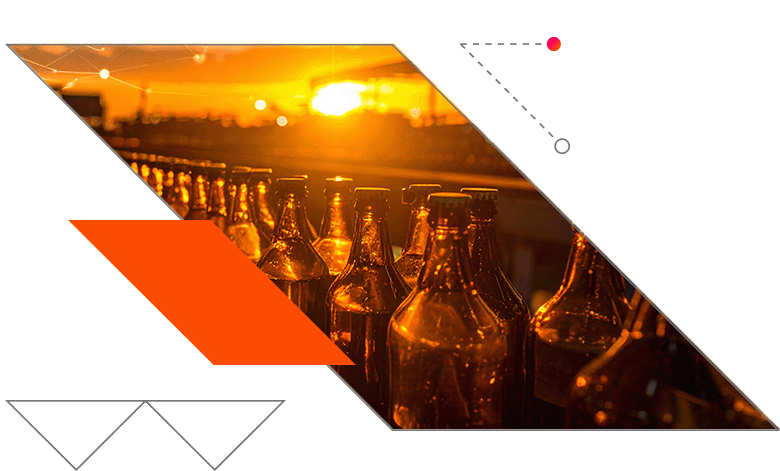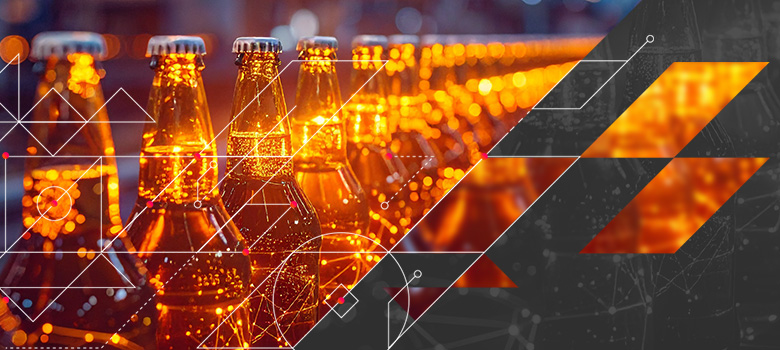Digitalization of the beverage industry: Challenges, trends & technologies
This year, companies in the beverage industry (manufacturers, beverage wholesalers and the food service industry) will once again have to overcome a number of challenges. They are confronted with increasing competitive pressure, new regulatory measures and changing conditions on the labor, raw materials and energy markets. In addition, ever higher customer requirements (e.g. in terms of product quality and variety, sustainability, price or service) must be met. All of these factors lead to cut-throat competition, which is particularly evident when new products are launched, as shelf space is limited.
In order to counter these effects, the possibilities of modern technologies such as Artificial Intelligence (AI), the Internet of Things (IoT) or Customer Relationship Management (CRM) solutions should be utilized. This is the only way for companies in the beverage industry to remain fit for the future and secure relevant competitive advantages. Most companies do not lack relevant data, but rather the ability to evaluate it in a meaningful way.
Digital solutions analyze enormous amounts of data in order to gain valuable insights into logistics, warehousing or customer behavior, for example. With this knowledge, companies make better decisions and achieve a significant reduction in costs and increase in efficiency.
Current challenges for companies in the beverage industry
As we have just seen, companies in the beverage industry are currently facing a number of challenges.
The following areas are particularly relevant and should be addressed by using smart tools and finding the right digitalization strategy.

Technological integration & digitalization of processes
The implementation of digital transformation usually fails during practical implementation despite the recognized value. The introduction of intelligent CRM systems and AI solutions is primarily hampered by convoluted and rigid processes as well as a short-term mindset. As a result, the digitalization of business processes is not viewed holistically, but only parts of the digitalization strategy are addressed. A lack of change management is also problematic, as changes are not accepted and lived by the team.
Market dynamics & high competition
In the highly competitive environment of the beverage market, small and medium-sized companies in particular must constantly adapt their strategies. It is crucial to continuously develop new products and thus take account of changing consumer preferences and existing trends in the industry. This applies to manufacturers as well as retailers, restaurateurs and beverage wholesalers. In the communication between a manufacturer and its partners in the food service industry, it is also important to address customers in a targeted and individual manner, on equal terms, in order to stand out from the competition.
Sustainability & environmental awareness
Not only the government, but also consumers are increasingly demanding climate protection measures such as environmentally friendly products and packaging. This presents the beverage wholesalers with the task of implementing sustainable practices and promoting reusable pooling systems, for example, in order to reduce the ecological footprint. By using these systems, energy and resources can be conserved, packaging material saved and waste avoided. Logistics processes should be made more efficient, unit and kilometer costs should be reduced and transparent tracking of individual transport packages should be achieved.
Tightening of legal regulations & standards
Compliance with new regulatory requirements (particularly with regard to food safety and transparent process documentation) represents a further challenge for the food industry. These laws have a particular impact on production processes and the composition of products. For example, the consumer protection organization Foodwatch has called for a "sugar tax" on drinks aimed primarily at children and young people.
Rising customer expectations & changing consumer behavior
With this high competitive pressure and the large selection of beverage brands, it is not only the sales price and beverage quality that determine success with consumers. The demand for individualization (e.g. low-sugar or low-caffeine beverage varieties) is also increasing and constant product availability is of great relevance, which makes on-demand production necessary.
Companies must ensure that they meet these requirements in an efficient and cost-saving manner. This is the only way to ensure strong customer loyalty and a high level of customer satisfaction in the long term, which in turn play a decisive role in brand loyalty. This is because the risk of switching brands is high if the actual experience does not meet customer expectations.
Logistics & supply chain management
In the event of disruptions in the manufacturer's supply and production chain (such as unexpected price increases for raw materials, crop or machine failures), it must be possible to flexibly optimize logistics processes in order to avoid bottlenecks.
In addition, predictive maintenance should be used to predict the maintenance requirements of systems and machines and prevent failure. In summary, such measures in the sense of a smart factory guarantee reliable delivery and storage capability.

Trends and best practices: successful digitalization in the beverage industry
In order to successfully face the challenges and problems mentioned, important trends and best practices must be taken into account when deciding on a digital strategy.
Using specific use cases, we will show you how digitalization in the food service industry can ensure greater efficiency, sustainability and improved customer experiences. Retailers and beverage wholesalers benefit from optimized logistics, data-driven business models and more direct access to the food service industry.
Ensuring high data quality
For data to be used effectively, it must not contain any errors. Therefore, new data must not only be procured continuously, but high data quality must also be ensured and continuously monitored. This is because correct recommendations (e.g. for marketing campaigns, demand & production planning or sales strategy) can only be made on the basis of solid data such as historical sales data, customer trends or market trends. Data analytics can be used, for example, to adapt stock levels and staffing requirements to peak times and modern control systems regulate energy consumption for cooling or preparation.
Implementation of smart automation
Thanks to intelligent IT solutions, manufacturers in the beverage industry are increasing the efficiency of their production and reacting to trends with innovations faster than the competition. Optimization begins with the automation of ordering, logistics and storage processes, which reduces operating costs and increases product quality.
The introduction of intelligent supply chain solutions such as track-and-trace systems in conjunction with reusable pooling systems reduces logistics costs and emissions, for example. Delays in the supply chain are detected at an early stage and can be better mitigated, and retailers and restaurateurs can react better and faster thanks to an optimized storage strategy.
This leads to a reduction in the use of resources, for example by avoiding spoiled food. In conjunction with this, digital warehouse management systems optimize stock levels with the help of AI and prevent overstocking or understocking.
Predictive maintenance & demand-oriented warehousing
To minimize technical failures, processes such as predictive maintenance help to detect damage and wear at an early stage. Their elimination can then be carried out in regular maintenance windows without any negative effects on the production chain in a cost- and time-optimized manner.
In order to meet their delivery obligations, manufacturers as well as retailers and restaurateurs should use IoT to manage their stock levels. This starts with on-demand production planning and extends to real-time managed warehousing by the manufacturer in order to always be able to meet customer demand.
Intelligent delivery services & subscription models
Online services such as online stores, delivery services and supermarket apps are on the rise. If beverage retailers and retailers do not support these processes, they will lose market share to innovatively positioned competitors. Thanks to the use of AI, subscription models and ordering services for favorite beverages or dynamic pricing based on consumer behavior are offered. Beverage wholesalers market their product range via smart delivery platforms, making it easier for customers to order drinks.
Personalized customer interactions
The use of AI makes it possible to individualize the customer experience and thus improve customer satisfaction. To this end, relevant customer data is collected and then analyzed in order to make tailored offers (subscription models or dynamic pricing) and give recommendations (suitable beverage alternatives, new products or online editions).
The personalization of the shopping experience also boosts sales through individual services (e.g. designing labels yourself online) for retailers and beverage wholesalers. Brand loyalty grows as customers remain loyal to their brand, which guarantees them individual experiences, variety and priority service for their preferences and needs.
Improved & personalized customer service
Chat bots provide support, for example, with finding new offers based on customer requests and generally offer the possibility of improved customer service. In the food service industry, service robots will soon be able to suggest a drink to go with the selected menu, for example, based on customer preferences.
Development of a holistic digital strategy
To overcome the hurdles involved in implementing a new solution, it must be accepted by the team. This includes extensive training and involvement of end users, the creation of missing structures or processes, but also the embedding of change management in the corporate culture.
This strategy must constantly adapt to market changes and evolve. The goal of digital and smart business processes also requires investment in security measures such as cyber security to protect important data and supply chains from attacks.
Innovative technologies and their use in the beverage industry
Those who invest in digital solutions at an early stage will secure long-term competitive advantages. The use of digital technologies is therefore not only sensible for the beverage industry, it is absolutely imperative and subject to a permanent cycle of adaptation and innovation.
We will show you which smart tools are available to support you in your digital transformation and how they can be implemented using specific application examples.

CRM solutions
CRM systems such as Microsoft Dynamics 365 manage and optimize customer interactions. Our solution ORBIS ConsumerONE is geared towards the special requirements of the consumer goods industry and supports marketing, sales and service in their daily tasks. For example, all relevant information, such as delivery data or billing modifications, is made available to the sales force so that they can react quickly on site at the customer's premises. Promotion-driven tasks and order entry are integral components of the solution in conjunction with comprehensive customer visit planning and optimization.
Contract lifecycle management
An intelligent solution for all contract processes in the company ensures a high level of transparency on the one hand and accelerates contract processing on the other. BeverageONE (designed and developed in collaboration with our partner CRMFIRST) records, manages and optimizes all sales-relevant processes. From food retail (off-trade) to food service (on-trade) to beverage wholesalers. Important negotiation levers such as pricing, margin optimization, advertising cost subsidies and financing models are recorded directly in contracts. This enables higher margins to be achieved, costs to be optimized and strategic partnerships to be secured in the long term.
Digital marketing strategies
Companies use intelligent marketing methods to better reach and retain their customers. A solution such as Dynamics 365 Customer Insights serves as a platform for all marketing processes along the customer journey.
Smart AI tools
Modern AI approaches enable precise predictions (e.g. for campaigns, volume requirements and strategies). Interactions in retail are tracked and evaluated, for example, by means of a smart shelf survey with AI-based analysis of a shelf video. Real-time analysis of food and drink menus on the website of a food service business is used to make recommendations for expanding the product range or improving the menu design.
One example of an AI tool made by ORBIS is the intelligent visit report “Eve”, which supports the creation of reports and generates activities in the back office. The customer advisor can, for example, dictate reports via voice input and receive instructions and answers to open questions from the tool.
IoT / IIoT
The Internet of Things and the Industrial Internet of Things (IIoT) play a crucial role in the automation and monitoring of production processes in machinery. Technology such as Microsoft Azure IoT simplifies implementation and contains industry-specific solutions. Data can be collected in the cloud, real-time visualization and reporting can be created and predictive maintenance can be implemented with Azure Machine Learning.
Cloud infrastructure
The use of cloud services enables companies to store data securely and access it from anywhere. Microsoft Cloud can quickly adapt to new requirements, can be seamlessly integrated and has a robust security infrastructure for data protection regulations.
Data analysis tools
These solutions help to evaluate large volumes of data in order to make informed decisions and increase efficiency. By using high data quality as a basis, historical data is ensured and meaningfully analyzed and made available to all areas of the company.
With Microsoft Power BI we provide a comprehensive analysis tool which you can use to create meaningful reports and dashboards in real time and thus obtain a holistic view of all company data.
Companies from the beverage industry rely on solutions from CRMFIRST & ORBIS
The development of our BeverageONE platform solution in collaboration with our partner CRMFIRST is based on our many years of expertise and the best practice examples mentioned above. With state-of-the-art technology and excellent consulting expertise, we cover both the retail and hospitality business and encompass all processes from account management to back office and sales force management. This includes, among other things, listing and campaign management, shelf data collection (classic and AI), order entry (with various order types) and sophisticated question management.
For more information, please arrange an individual 1:1 meeting with our digitalization experts for the beverage industry. We will be happy to show you how you can unleash your full potential with our solutions and prepare your company for the future.

I’m here to help you
Sascha Gros
(Senior Account Manager)
Tel.: +49 681 9924 9627
E-Mail: sascha.gros(at)orbis.de





